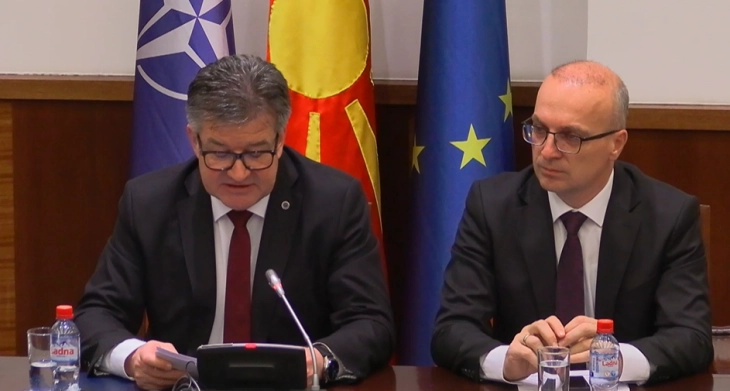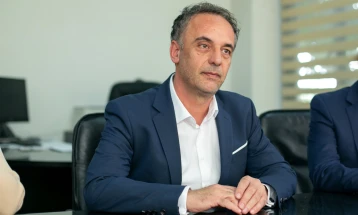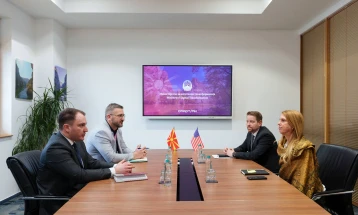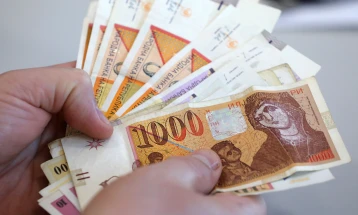Lajčák: EU membership best option for North Macedonia
- Membership in the European Union is the best option both for North Macedonia and the region in the current geopolitical context, said Miroslav Lajčák, EU Special Representative for the Belgrade-Pristina Dialogue, at the seventh plenary conference of the National Convention on the European Union in Republic of North Macedonia (NCEU-MK) held in Parliament on Wednesday.

Skopje, 11 December 2024 (MIA) - Membership in the European Union is the best option both for North Macedonia and the region in the current geopolitical context, said Miroslav Lajčák, EU Special Representative for the Belgrade-Pristina Dialogue, at the seventh plenary conference of the National Convention on the European Union in Republic of North Macedonia (NCEU-MK) held in Parliament on Wednesday.
Lajčák urged the country’s politicians to make use of the momentum and place the shared interest over partisan interests. He recalled the statement of the new EU Commissioner for Enlargement, Marta Kos, who said that negotiations require hard work by all of society, noting that they must be a national project.
“When you launched this process, I believed that you would make great progress, but unfortunately you aren’t even close, and I share your frustration. Everything that was mentioned must be fulfilled. It is a fact that the parameters have been established, and I won’t say anything new, you shouldn’t miss out on this opportunity and risk getting left behind. Additionally, in view of recent geostrategic events, enlargement is really a priority for this European Commission,” Lajčák said.

Özlem Canel, Ambassador of the Kingdom of the Netherlands to North Macedonia, stressed that the enthusiasm for EU accession can help stakeholders bring the region closer to the EU and that the Netherlands wants to see a prosperous and safe Western Balkans that would join the EU once it is ready.
“The rule of law isn’t a part of the Fundamentals cluster in vain. We, in the Netherlands, truly believe that the rule of law is a foundation in our society, the rule of law will make you a successful member state,” Canel said.
The chair of Parliament’s European Affairs Committee and VMRO-DPMNE MP Antonio Miloshoski highlighted the drawn-out negotiations of Serbia and Montenegro with the EU to note that enlargement isn’t at the top of the agenda for some EU member states.
“Despite the blockade from Bulgaria, I have been wondering whether Bulgaria is acting by itself with this blockade. We have been a sovereign country for 30 years and Bulgaria has never raised this issue before. Is Bulgaria’s blockade an independent invention that they are using on a bilateral basis, or are there other members within the EU who have nothing against the postponing of the enlargement process by five, ten years. Within the EU itself there are serious topics on whether the EC can have six additional commissioners, whether the EP can have 30 or 40 new MEPs, whether the European funds for agriculture, Eurozone, or other areas within the EU will be ready to admit six new members,” Miloshoski said.

Miloshoski said he believes that in the future, the EU could offer a type of associated membership or gradual membership as a replacement for full-fledged membership.
Venko Filipche, head of the National European Integration Council and SDSM MP, said that other political factors want to see the Western Balkans fully integrated within the EU as well.
“Europe itself is working on the Green Agenda, decarbonization, reducing the innovation gap with the US and China, and all of that as part of a structure with commissioners, and the Growth Plan that has been created alongside the European agenda about what the candidate states should do exactly. The National Council is the right place to hold consultations on the reform agenda. The geopolitical relations are complex, yet in such a complex situation we still managed to conclude a complex process – the screening process,” Filipche said.
Referring to the adoption of the constitutional amendments, Filipche said it is clear how the country should proceed forward. “I believe everything else is an unnecessary waste of time,” Filipche said.
NCEU-MK national coordinator Professor Mileva Gjurovska said the main question posed by the Convention at the plenary sessions is its realized impact on the Euro-integration process.

“The new Government, with its initial enthusiasm and appropriate attention to the reform process, will have an opportunity for positive changes. The shared practices from the countries who have gone through the negotiating process show that a key factor for success is the political consensus and the recruitment of qualified, but also motivated, human resources,” Gjurovska said.
Photo: Screenshot







